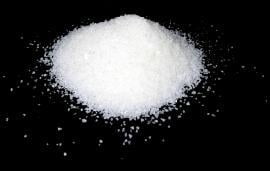



TSAP
Superabsorbent polymers (SAPs) are a type of organic, biodegradable polymer that can absorb and retain large amounts of water. One common type of SAP is potassium polyacrylate crystals. These crystals are often used as a water-retaining agent for plants in agriculture and gardening.
When mixed with soil or placed around plant roots, the SAP crystals can absorb and store water many times their own weight. This retained water is slowly released to the plants, providing a consistent water supply even during dry periods. As a result, the need for frequent watering is reduced significantly, typically by around 75% or more, depending on the specific conditions and plants being grown.
The use of superabsorbent polymers in agriculture has been shown to improve water efficiency, conserve water resources, and promote better plant growth and survival, especially in arid or drought-prone regions. Additionally, their biodegradable nature ensures that they break down over time without causing harm to the environment.
Key characteristics of this SAP include:
Super absorbency: The polymer can absorb and retain a significant amount of water, forming a gel-like substance in the process.
Organic and biodegradable: This type of SAP is organic, which means it is derived from natural sources and is biodegradable, making it environmentally friendly.
Particle size: The SAP is in the form of small particles, usually ranging from 10 to 20 mesh in size. The term "mesh" refers to the size of the particles, with a higher mesh number indicating smaller particle size.
Water-saving benefits: When mixed with soil or growing media, the SAP can significantly reduce the necessity for watering plants. It can absorb excess water and release it gradually to the plant roots, providing a steady water supply and preventing water wastage.
Potassium polyacrylate: This indicates that the polymer contains potassium ions, which can also be beneficial for plant growth as potassium is an essential nutrient for plants.
The use of super absorbent polymers in agriculture and horticulture has gained popularity due to their water-saving capabilities and their ability to improve plant survival in dry or arid conditions. By reducing the frequency of watering, these polymers contribute to water conservation efforts and can be particularly beneficial for regions facing water scarcity or for potted plants where regular watering might be challenging.
It's important to note that while super absorbent polymers offer advantages in water retention, they should be used in appropriate quantities to avoid potential issues such as waterlogging or nutrient leaching. Proper application and dosage depend on factors like plant species, soil type, climate, and container size. Farmers, gardeners, and horticulturists should carefully follow guidelines and recommendations for their specific applications.

